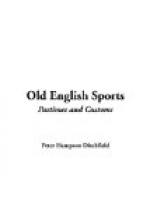The Christmas holidays extended over twelve days, which bring us to January 6th, the Feast of the Epiphany. It is stated that “in the days of King Alfred a law was made with regard to holidays, by virtue of which the twelve days after the Nativity of our Saviour were made festivals.” Twelfth Day Eve was a great occasion among the rustics of England, and many curious customs are connected with it. In Herefordshire the farmers and servants used to meet together in the evening and walk to a field of wheat. There they lighted twelve small fires and one large one[2], and forming a circle round the huge bonfire, they raised a shout, which was answered from all the neighbouring fields and villages. At home the busy housewife was preparing a hearty supper for the men. After supper they adjourned to the ox-stalls, and the master stood in front of the finest of the oxen and pledged him in a curious toast; the company followed his example with all the other oxen, and then they returned to the house and found all the doors locked, and admittance sternly refused until they had sung some joyous songs.
In the south of Devonshire, on the eve of the Epiphany, the best-bearing trees in the orchard were encircled by the farmer and his labourers, who sang the following refrain—
“Here’s
to thee, old apple-tree,
Whence thou may’st
bud, and whence thou may’st blow,
And whence thou may’st
bear apples enow!
Hats
full! caps full!
Bushel-bushel-sacks
full,
And
my pockets full too! Huzza!”
The returning company were not allowed to enter the house until some one guessed what was on the spit, which savoury tit-bit was awarded to the man who first named it.
The youths of the village during the holidays had plenty of sport, outdoor and indoor, which kept out the cold by wholesome exercise and recreative games. Many a hard battle was fought with snowballs, or with bat-and-ball on the ice; the barns were the scenes of many a wrestling match or exciting game at skittles; and in the evenings they played such romping games as blind-man’s-buff, hunt the slipper, and others of a similar character. While the company sat round the yule-log blazing on the hearth, eating mince-pies, or plum porridge, and quaffing a bowl of well-spiced elder wine, the mummers would enter, decked out in ribands and strange dresses, execute their strange antics, and perform their curious play. So the wintry days passed until Twelfth Night, with its pleasing associations and mirthful customs.




